Abstract
Previous studies from this laboratory have suggested a role for cell-mediated immunity in host defense against Legionella pneumophila. In this paper, cell-mediated immunity to L. pneumophila in patients recovered from Legionnaires' disease was studied by examining patient mononuclear cell responses to L. pneumophila antigens. Patient mononuclear cells were assayed both for their capacity to respond to L. pneumophila antigens with the production of cytokines that activate monocytes, as measured by monocyte inhibition of L. pneumophila multiplication, and for their capacity to respond with proliferation, as measured by [3H]thymidine incorporation.
Patient mononuclear cells incubated with formalin-killed L. pneumophila generated cytokines (supernatants) that were capable of activating in vitro freshly explanted monocytes from a person without historical or serological evidence of L. pneumophila infection (nonpatient). Such activated nonpatient monocytes inhibited the intracellular multiplication of L. pneumophila, and the degree of inhibition was proportional to the concentration of supernatant added. Patient mononuclear cells incubated with 5 × 106 − 5 × 108 formalin-killed L. pneumophila/ml for 4 d produced maximally potent supernatants; supernatants generated in flat-bottomed wells were equivalent in potency to supernatants generated in cone-shaped wells. Patient L. pneumophila-induced mononuclear cell supernatants were less potent than patient concanavalin A-induced mononuclear cell supernatants. Patient mononuclear cells also responded to formalin-killed L. pneumophila with proliferation (lymphoproliferation).
Patient mononuclear cells responded more strongly to L. pneumophila antigens than mononuclear cells of age- and sex-matched nonpatients, as measured by both assays; responses to concanavalin A were comparable. Mononuclear cells from patients recovered from Legionnaires' disease responded more strongly to L. pneumophila than to Mycobacterium leprae antigens, whereas mononuclear cells from patients with tuberculoid leprosy responded more strongly to M. leprae antigens.
These findings indicate that cell-mediated immunity to L. pneumophila develops in patients with Legionnaires' disease and, taken together with previously reported findings, that cell-mediated immunity plays a major role in host defense against L. pneumophila.
The monocyte activation assay described in this paper has general applicability for the study of monocyte and mononuclear cell effector functions in selected patients. The assay may be used to study (a) the capacity of a patient's monocytes to be activated to an antimicrobial potential by a standard preparation of cytokines and (b) the capacity of a patient's mononuclear cells to generate such monocyte-activating cytokines in response to a mitogen or antigen.
Full text
PDF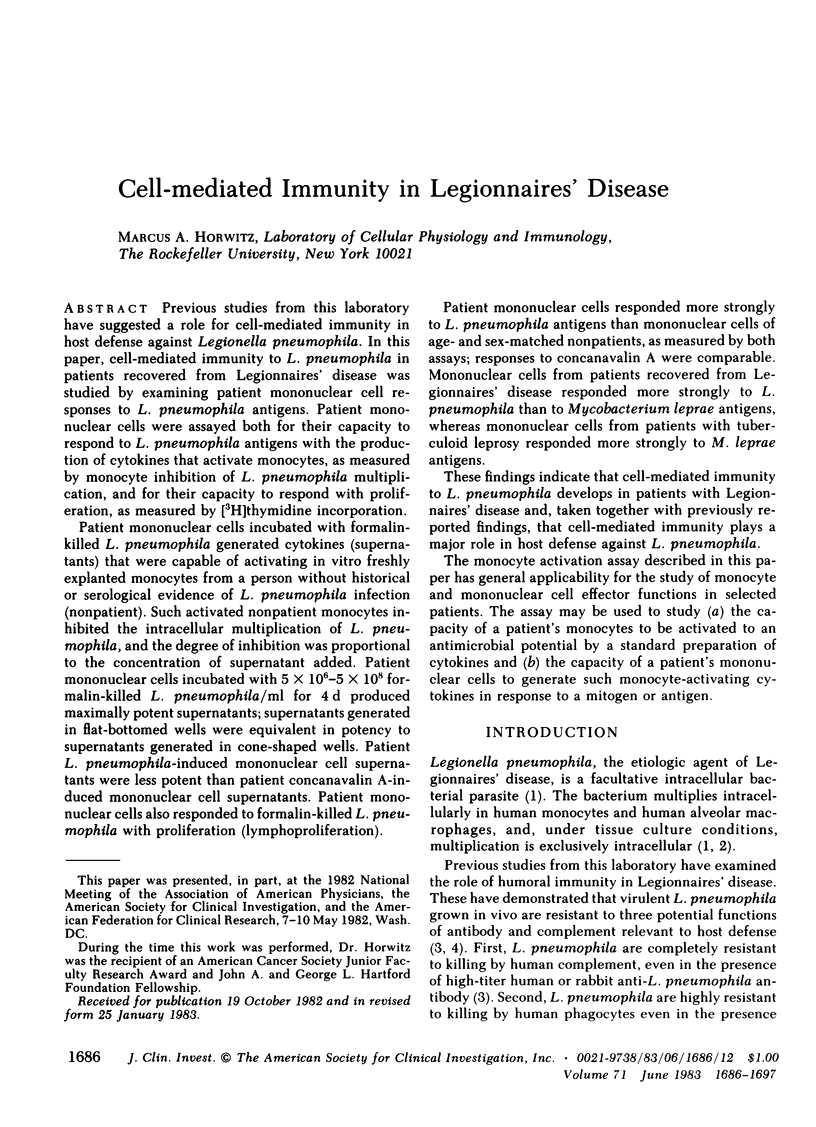
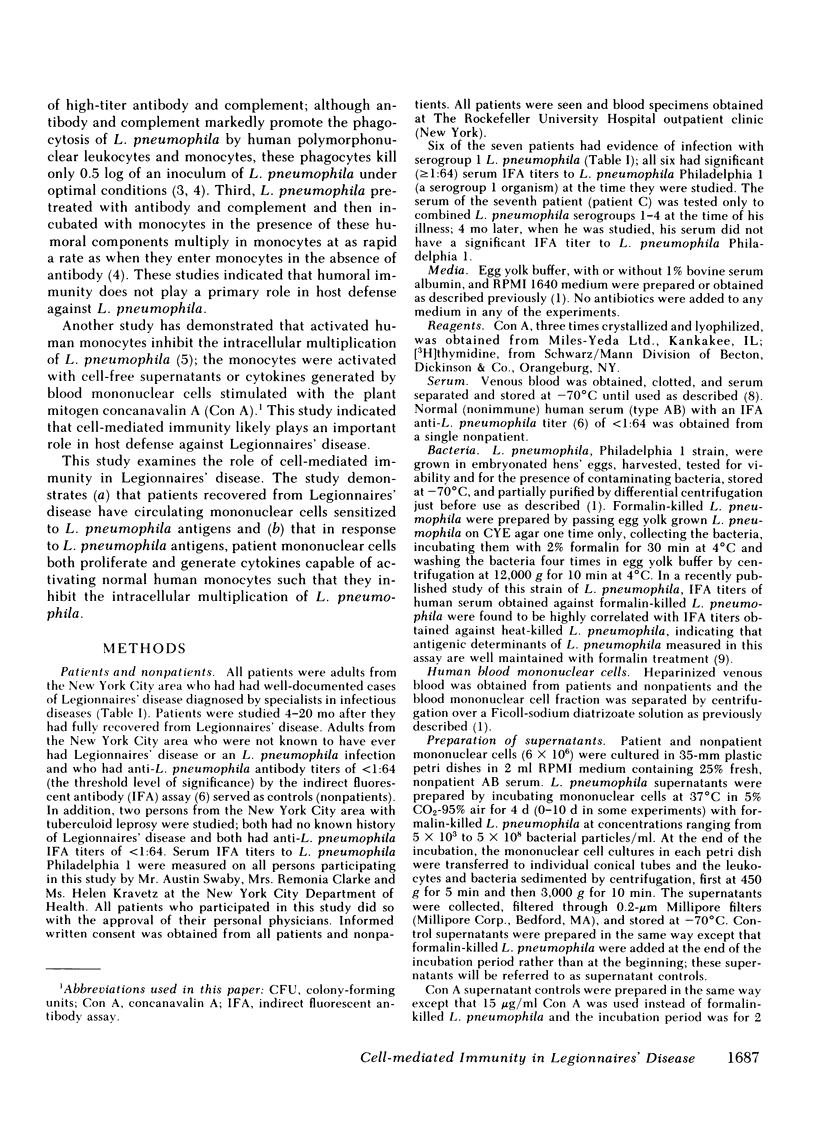
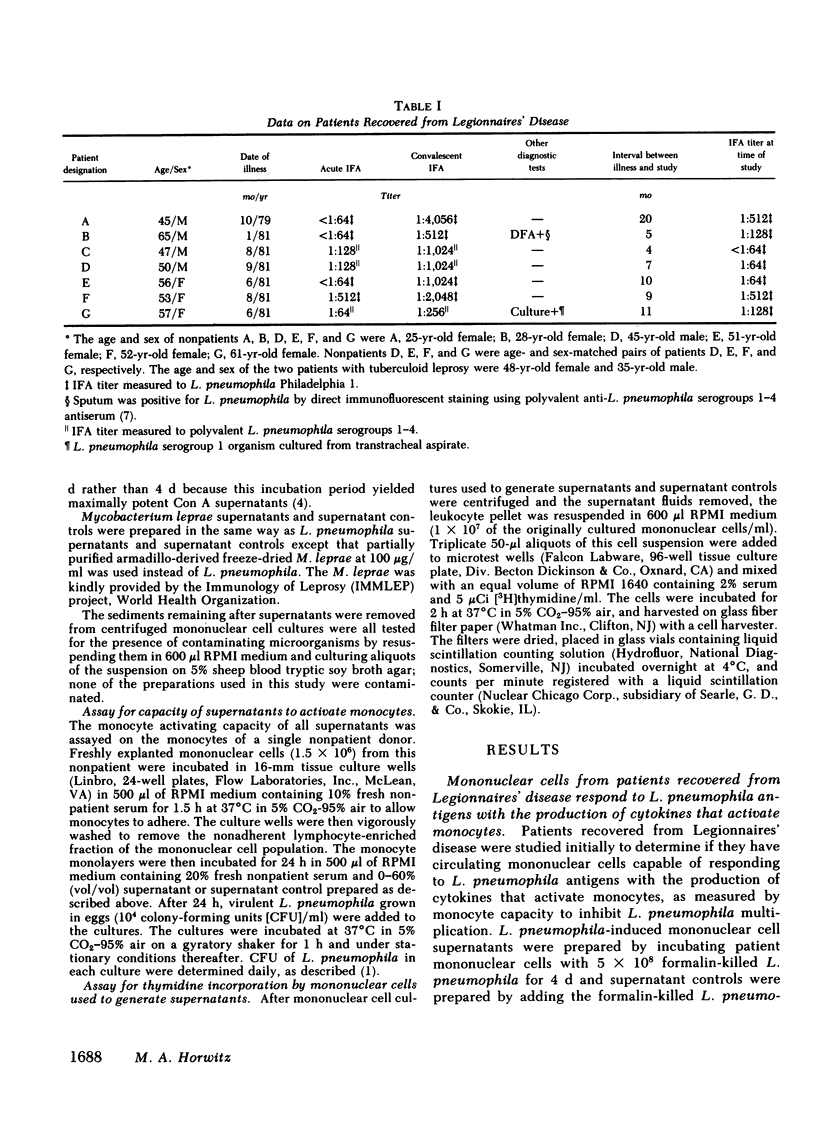
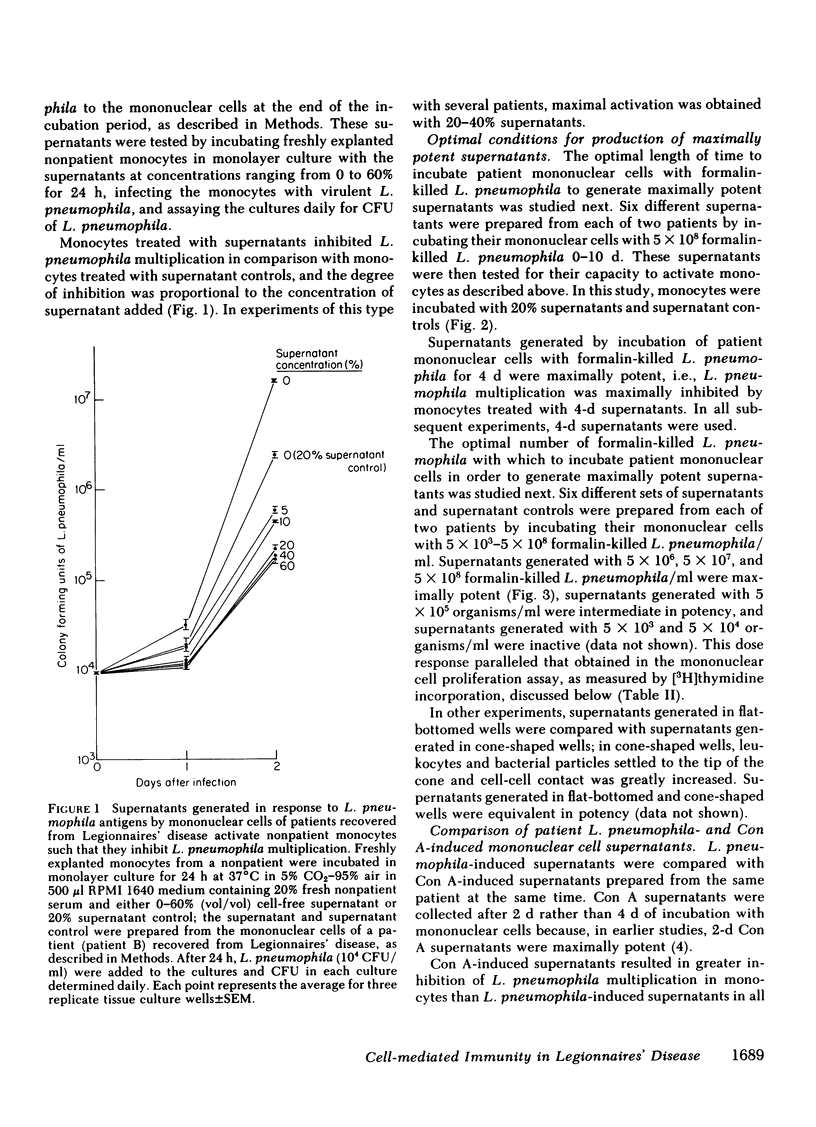
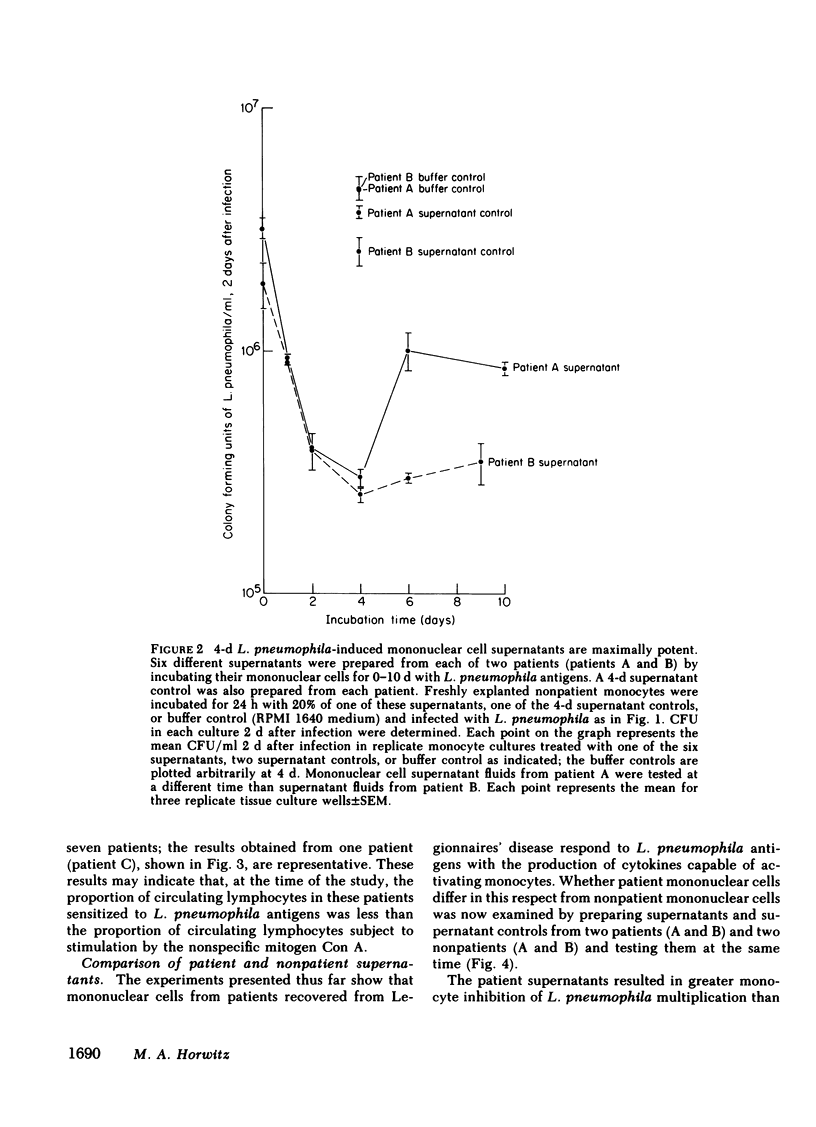
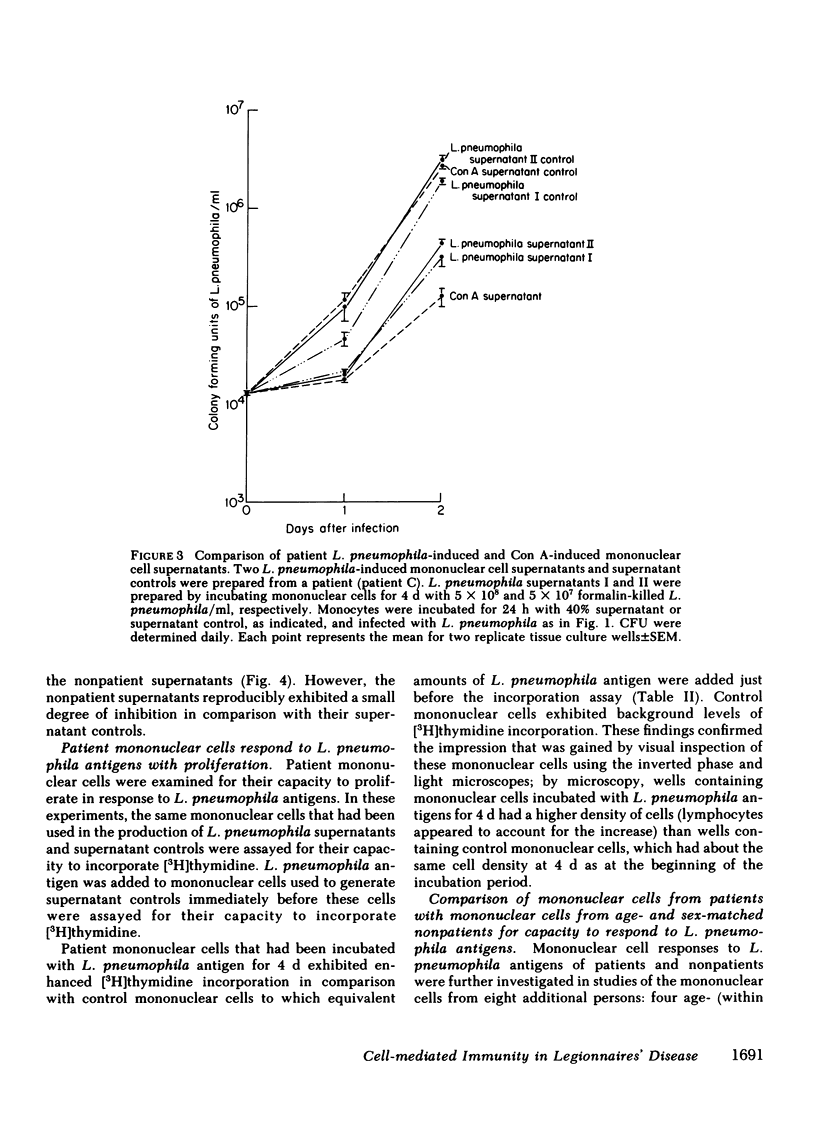
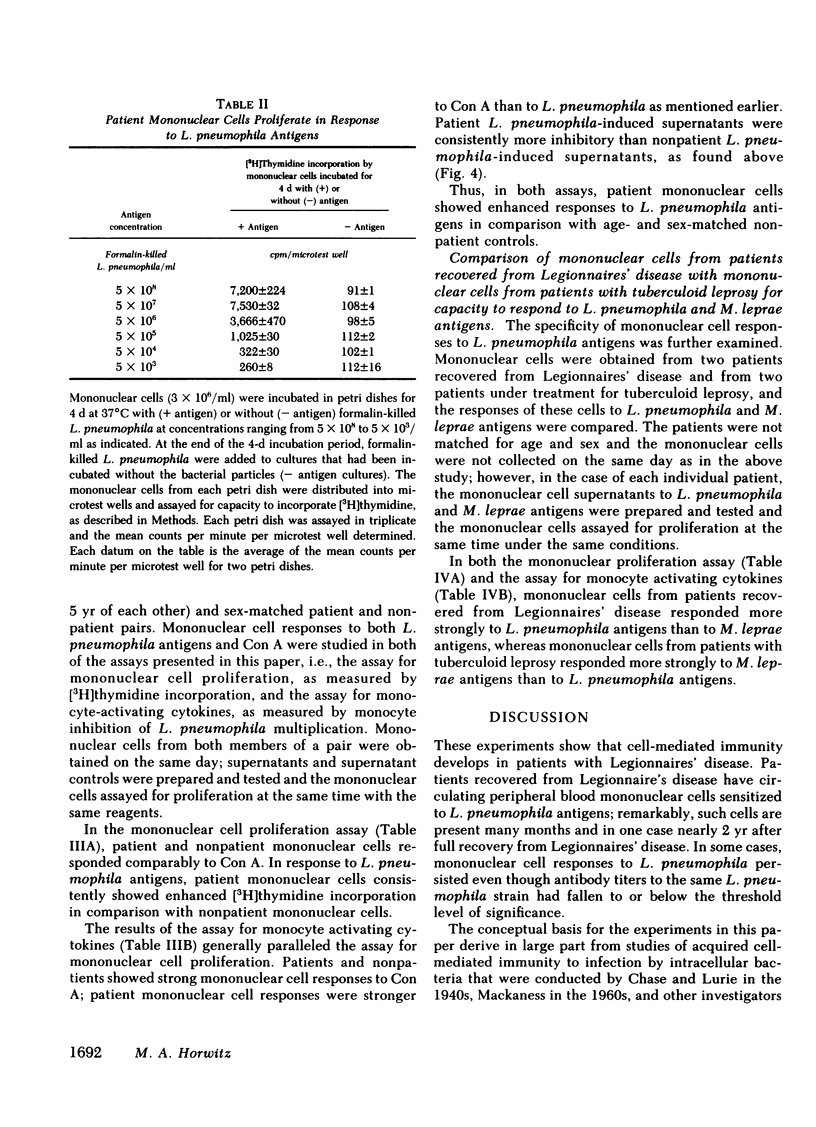
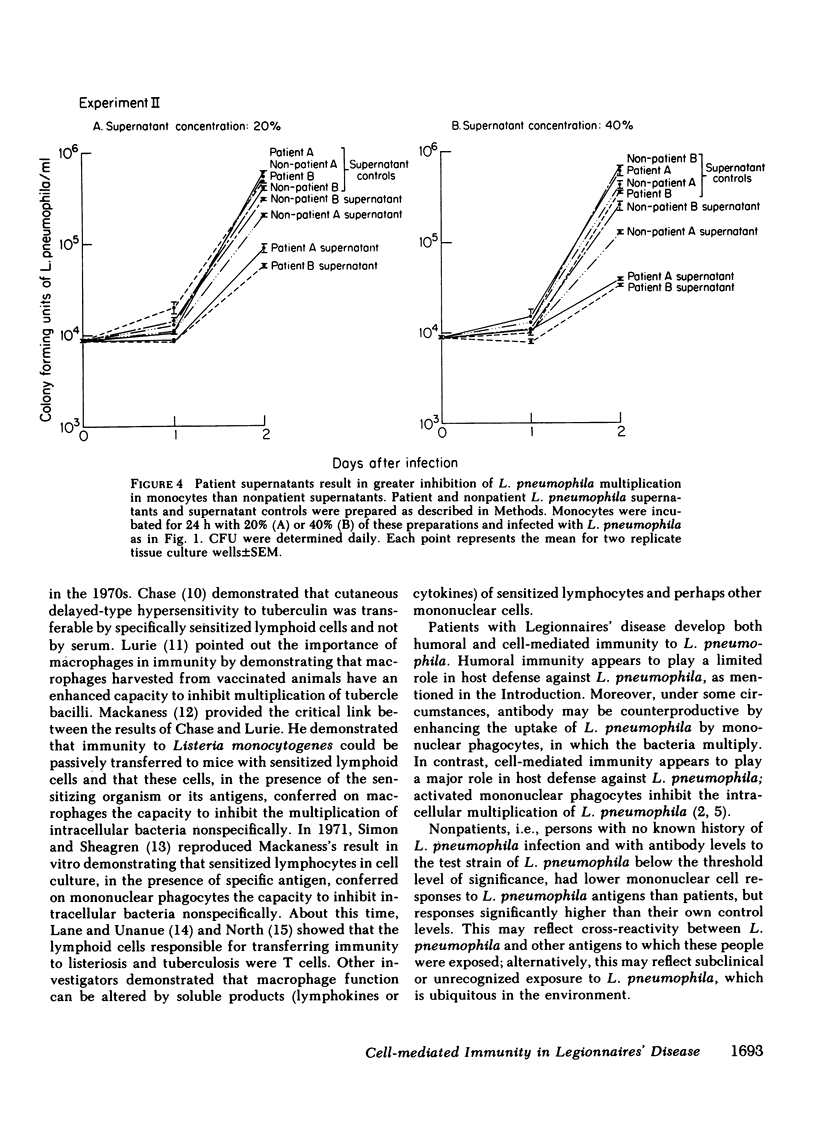
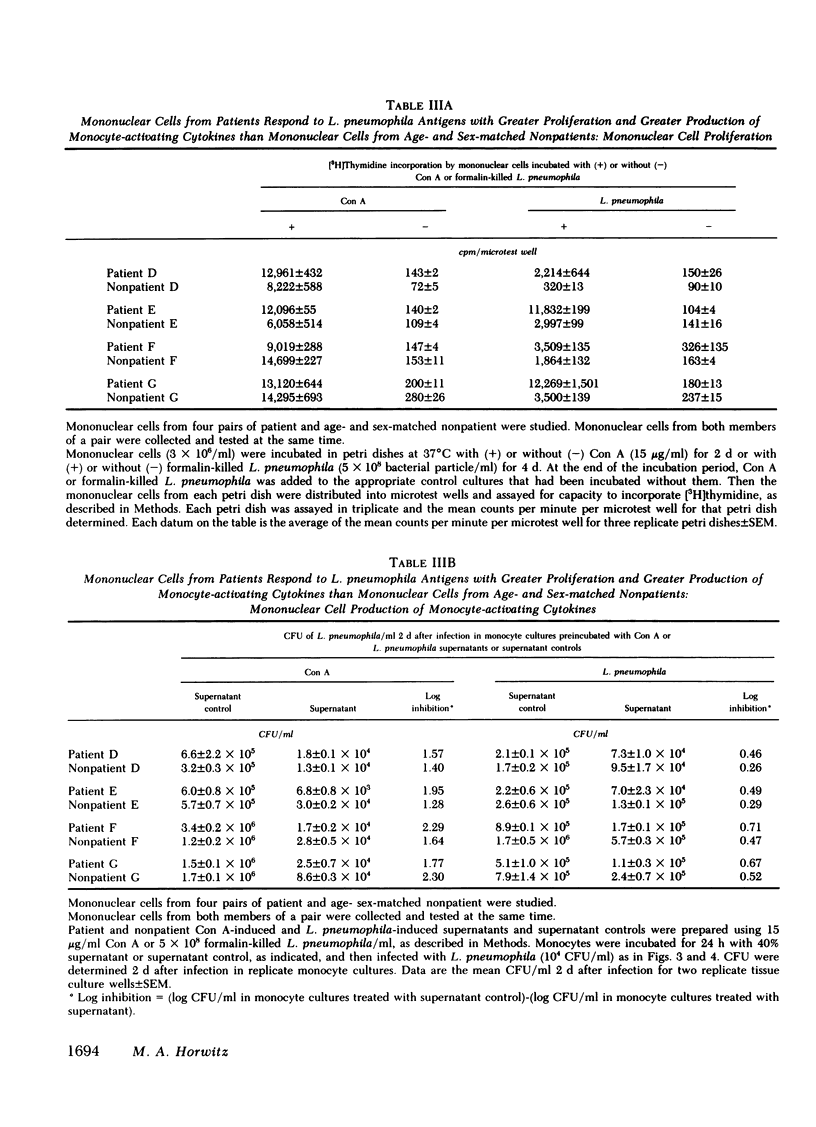
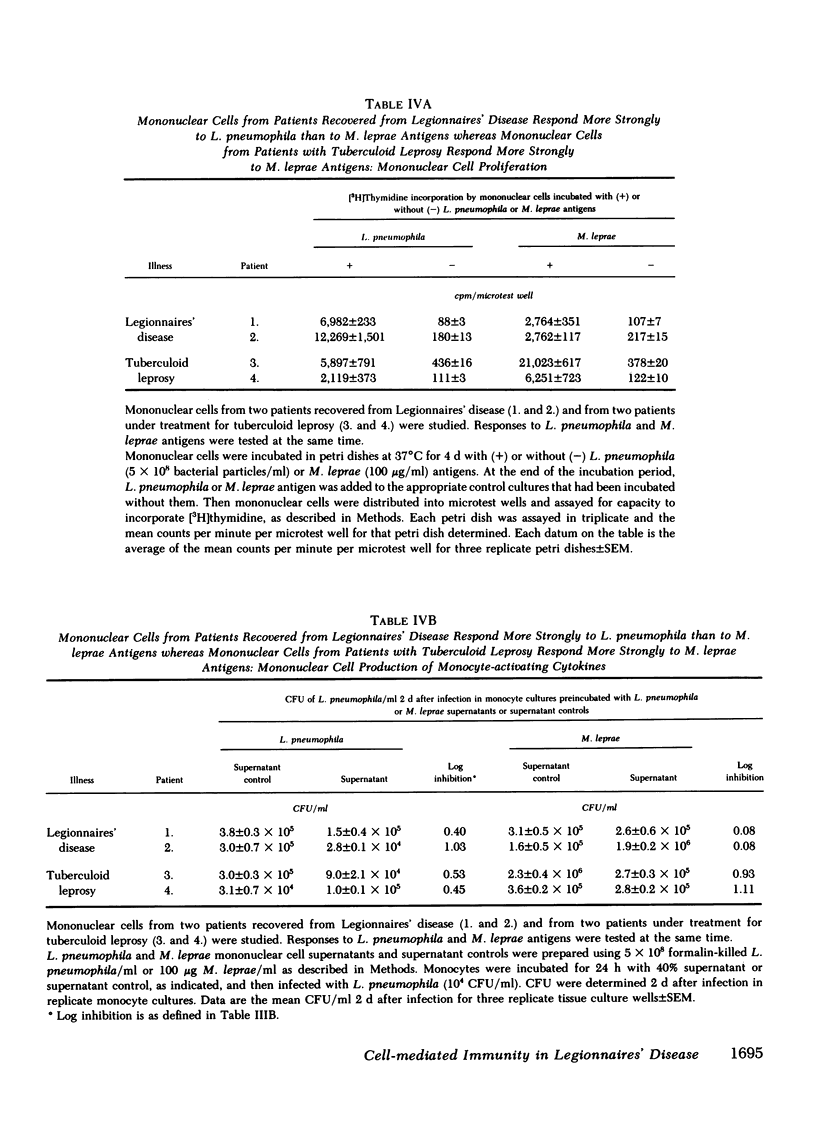
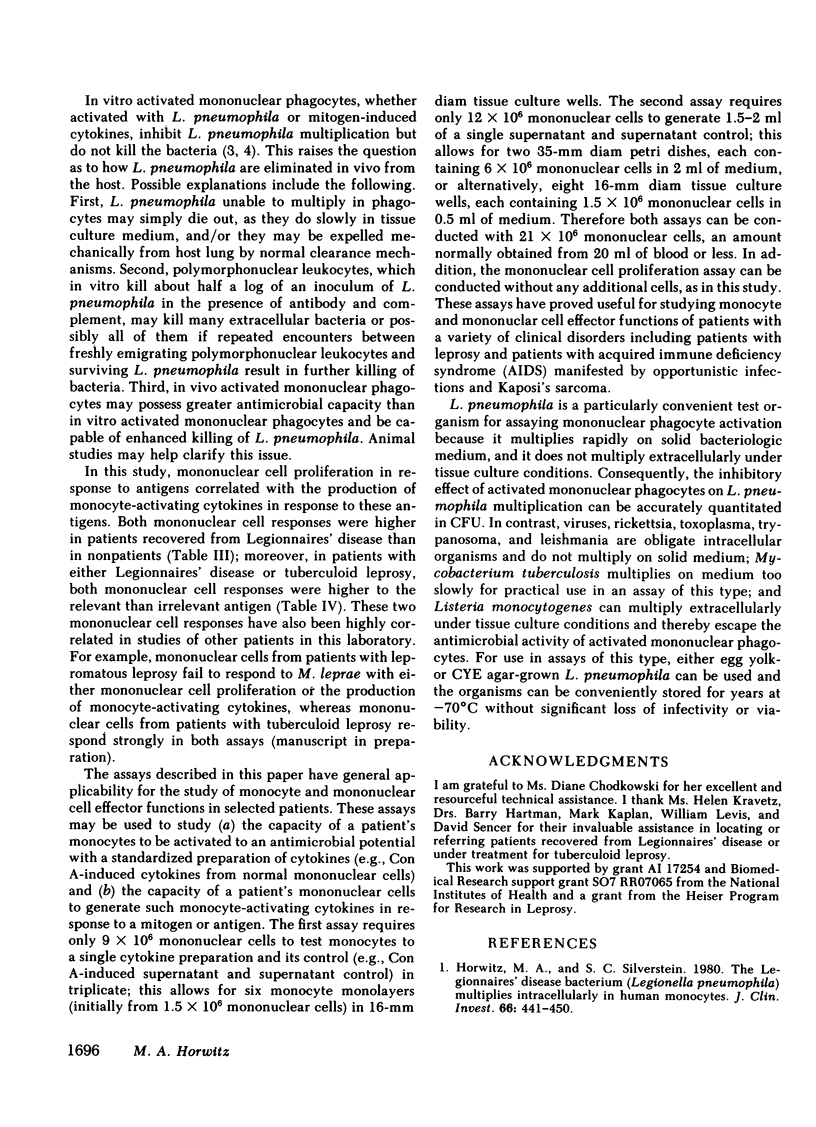
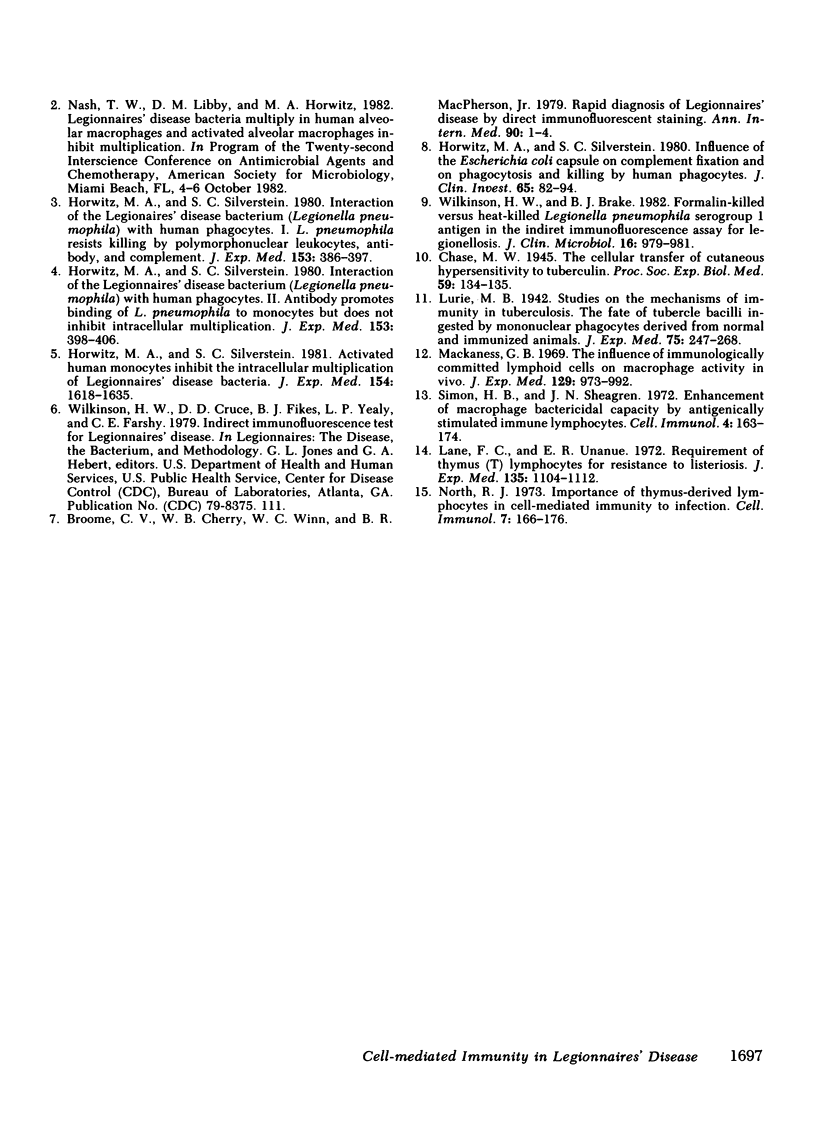
Selected References
These references are in PubMed. This may not be the complete list of references from this article.
- Broome C. V., Cherry W. B., Winn W. C., Jr, MacPherson B. R. Rapid diagnosis of Legionnaires' disease by direct immunofluorescent staining. Ann Intern Med. 1979 Jan;90(1):1–4. doi: 10.7326/0003-4819-90-1-1. [DOI] [PubMed] [Google Scholar]
- Horwitz M. A., Silverstein S. C. Activated human monocytes inhibit the intracellular multiplication of Legionnaires' disease bacteria. J Exp Med. 1981 Nov 1;154(5):1618–1635. doi: 10.1084/jem.154.5.1618. [DOI] [PMC free article] [PubMed] [Google Scholar]
- Horwitz M. A., Silverstein S. C. Influence of the Escherichia coli capsule on complement fixation and on phagocytosis and killing by human phagocytes. J Clin Invest. 1980 Jan;65(1):82–94. doi: 10.1172/JCI109663. [DOI] [PMC free article] [PubMed] [Google Scholar]
- Horwitz M. A., Silverstein S. C. Interaction of the Legionnaires' disease bacterium (Legionella pneumophila) with human phagocytes. I. L. pneumophila resists killing by polymorphonuclear leukocytes, antibody, and complement. J Exp Med. 1981 Feb 1;153(2):386–397. doi: 10.1084/jem.153.2.386. [DOI] [PMC free article] [PubMed] [Google Scholar]
- Horwitz M. A., Silverstein S. C. Interaction of the legionnaires' disease bacterium (Legionella pneumophila) with human phagocytes. II. Antibody promotes binding of L. pneumophila to monocytes but does not inhibit intracellular multiplication. J Exp Med. 1981 Feb 1;153(2):398–406. doi: 10.1084/jem.153.2.398. [DOI] [PMC free article] [PubMed] [Google Scholar]
- Horwitz M. A., Silverstein S. C. Legionnaires' disease bacterium (Legionella pneumophila) multiples intracellularly in human monocytes. J Clin Invest. 1980 Sep;66(3):441–450. doi: 10.1172/JCI109874. [DOI] [PMC free article] [PubMed] [Google Scholar]
- Lane F. C., Unanue E. R. Requirement of thymus (T) lymphocytes for resistance to listeriosis. J Exp Med. 1972 May 1;135(5):1104–1112. doi: 10.1084/jem.135.5.1104. [DOI] [PMC free article] [PubMed] [Google Scholar]
- Mackaness G. B. The influence of immunologically committed lymphoid cells on macrophage activity in vivo. J Exp Med. 1969 May 1;129(5):973–992. doi: 10.1084/jem.129.5.973. [DOI] [PMC free article] [PubMed] [Google Scholar]
- North R. J. Importance of thymus-derived lymphocytes in cell-mediated immunity to infection. Cell Immunol. 1973 Apr;7(1):166–176. doi: 10.1016/0008-8749(73)90193-7. [DOI] [PubMed] [Google Scholar]
- Simon H. B., Sheagren J. N. Enhancement of macrophage bactericidal capacity by antigenically stimulated immune lymphocytes. Cell Immunol. 1972 Jun;4(2):163–174. doi: 10.1016/0008-8749(72)90015-9. [DOI] [PubMed] [Google Scholar]
- Wilkinson H. W., Brake B. J. Formalin-killed versus heat-killed Legionella pneumophila serogroup 1 antigen in the indirect immunofluorescence assay for legionellosis. J Clin Microbiol. 1982 Nov;16(5):979–981. doi: 10.1128/jcm.16.5.979-981.1982. [DOI] [PMC free article] [PubMed] [Google Scholar]


